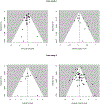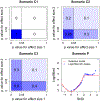Testing small study effects in multivariate meta-analysis
- PMID: 32720712
- PMCID: PMC7736122
- DOI: 10.1111/biom.13342
Testing small study effects in multivariate meta-analysis
Abstract
Small study effects occur when smaller studies show different, often larger, treatment effects than large ones, which may threaten the validity of systematic reviews and meta-analyses. The most well-known reasons for small study effects include publication bias, outcome reporting bias, and clinical heterogeneity. Methods to account for small study effects in univariate meta-analysis have been extensively studied. However, detecting small study effects in a multivariate meta-analysis setting remains an untouched research area. One of the complications is that different types of selection processes can be involved in the reporting of multivariate outcomes. For example, some studies may be completely unpublished while others may selectively report multiple outcomes. In this paper, we propose a score test as an overall test of small study effects in multivariate meta-analysis. Two detailed case studies are given to demonstrate the advantage of the proposed test over various naive applications of univariate tests in practice. Through simulation studies, the proposed test is found to retain nominal Type I error rates with considerable power in moderate sample size settings. Finally, we also evaluate the concordance between the proposed tests with the naive application of univariate tests by evaluating 44 systematic reviews with multiple outcomes from the Cochrane Database.
Keywords: comparative effectiveness research; composite likelihood; outcome reporting bias; publication bias; small study effect; systematic review.
© 2020 The International Biometric Society.
Figures



Comment in
-
Discussion on "Testing small study effects in multivariate meta-analysis" by Chuan Hong, Georgia Salanti, Sally Morton, Richard Riley, Haitao Chu, Stephen E. Kimmel, and Yong Chen.Biometrics. 2020 Dec;76(4):1255-1259. doi: 10.1111/biom.13343. Epub 2020 Aug 29. Biometrics. 2020. PMID: 32860419 No abstract available.
-
Discussion on 'Testing small study effects in multivariate meta-analysis' by Chuan Hong, Georgia Salanti, Sally Morton, Richard Riley, Haitao Chu, Stephen E Kimmel and Yong Chen.Biometrics. 2020 Dec;76(4):1260-1261. doi: 10.1111/biom.13344. Epub 2020 Aug 29. Biometrics. 2020. PMID: 32860435 No abstract available.
-
Discussion on "Testing small study effects in multivariate meta-analysis" by Chuan Hong, Georgia Salanti, Sally Morton, Richard Riley, Haitao Chu, Stephen E. Kimmel and Yong Chen.Biometrics. 2020 Dec;76(4):1251-1254. doi: 10.1111/biom.13345. Epub 2020 Aug 29. Biometrics. 2020. PMID: 32860439 Free PMC article. No abstract available.
Similar articles
-
The future of Cochrane Neonatal.Early Hum Dev. 2020 Nov;150:105191. doi: 10.1016/j.earlhumdev.2020.105191. Epub 2020 Sep 12. Early Hum Dev. 2020. PMID: 33036834
-
Publication and related bias in meta-analysis: power of statistical tests and prevalence in the literature.J Clin Epidemiol. 2000 Nov;53(11):1119-29. doi: 10.1016/s0895-4356(00)00242-0. J Clin Epidemiol. 2000. PMID: 11106885
-
Detecting small-study effects and funnel plot asymmetry in meta-analysis of survival data: A comparison of new and existing tests.Res Synth Methods. 2018 Mar;9(1):41-50. doi: 10.1002/jrsm.1266. Epub 2017 Nov 28. Res Synth Methods. 2018. PMID: 28975717 Free PMC article.
-
Publication Bias and Nonreporting Found in Majority of Systematic Reviews and Meta-analyses in Anesthesiology Journals.Anesth Analg. 2016 Oct;123(4):1018-25. doi: 10.1213/ANE.0000000000001452. Anesth Analg. 2016. PMID: 27537925 Review.
-
Assessment of publication bias required improvement in oral health systematic reviews.J Clin Epidemiol. 2016 Aug;76:118-24. doi: 10.1016/j.jclinepi.2016.02.019. Epub 2016 Mar 3. J Clin Epidemiol. 2016. PMID: 26939926 Review.
Cited by
-
The Outcomes of Trauma-Informed Practice in Youth Justice: An Umbrella Review.J Child Adolesc Trauma. 2024 Apr 22;17(3):939-955. doi: 10.1007/s40653-024-00634-5. eCollection 2024 Sep. J Child Adolesc Trauma. 2024. PMID: 39309340 Free PMC article.
-
Use of PD-1/PD-L1 inhibitors in non-small cell lung cancer in elderly patients: a meta-analysis and systematic review of randomized clinical trials.Clin Transl Oncol. 2025 Aug 8. doi: 10.1007/s12094-025-04027-4. Online ahead of print. Clin Transl Oncol. 2025. PMID: 40779150 Review.
-
Small Study Effects in Diagnostic Imaging Accuracy: A Meta-Analysis.JAMA Netw Open. 2022 Aug 1;5(8):e2228776. doi: 10.1001/jamanetworkopen.2022.28776. JAMA Netw Open. 2022. PMID: 36006641 Free PMC article.
-
Efficacy and safety of novel complement inhibitors in atypical haemolytic uremic syndrome: a protocol for systematic review and meta-analysis.BMJ Open. 2025 May 14;15(5):e100159. doi: 10.1136/bmjopen-2025-100159. BMJ Open. 2025. PMID: 40374233 Free PMC article.
-
THE EFFECT DIRECTION SHOULD BE TAKEN INTO ACCOUNT WHEN ASSESSING SMALL-STUDY EFFECTS.J Evid Based Dent Pract. 2023 Mar;23(1):101830. doi: 10.1016/j.jebdp.2022.101830. Epub 2022 Dec 24. J Evid Based Dent Pract. 2023. PMID: 36914304 Free PMC article.
References
-
- Begg CB and Mazumdar M (1994). Operating characteristics of a rank correlation test for publication bias. Biometrics pages 1088–1101. - PubMed
-
- Benjamini Y and Hochberg Y (1995). Controlling the false discovery rate: a practical and powerful approach to multiple testing. Journal of the Royal statistical society: series B (Methodological) 57, 289–300.
-
- Benjamini Y, Yekutieli D, et al. (2001). The control of the false discovery rate in multiple testing under dependency. The annals of statistics 29, 1165–1188.
-
- Bürkner P-C and Doebler P (2014). Testing for publication bias in diagnostic meta-analysis: a simulation study. Statistics in Medicine 33, 3061–3077. - PubMed

